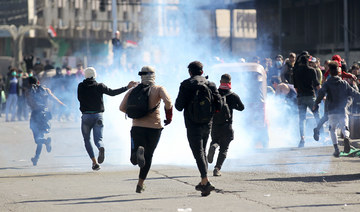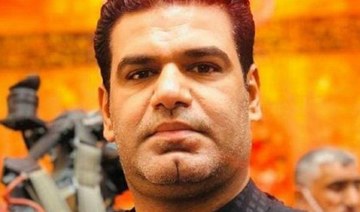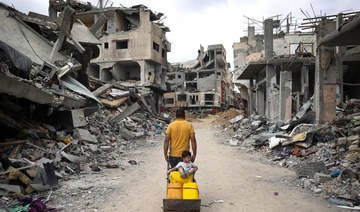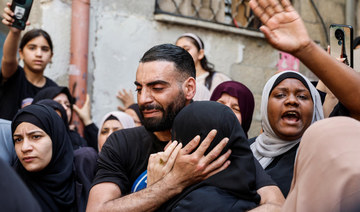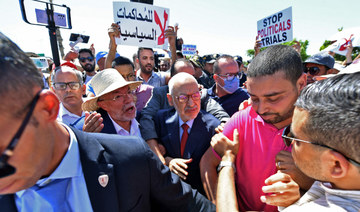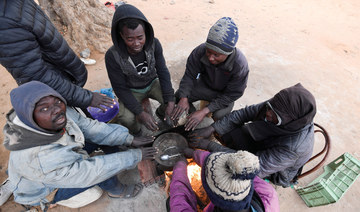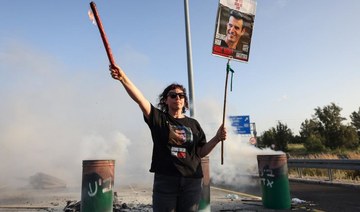BAGHDAD: A protester died Tuesday after being shot as clashes erupted between demonstrators and Iraqi security forces in Baghdad’s Tahrir Square, Iraqi security officials and a rights monitor said.
Security forces used live ammunition to disperse crowds after protesters began throwing stones, witnesses and Iraqi officials said.
The officials spoke on condition of anonymity in line with regulations.
The shooting began after security forces used tear gas to disperse crowds. The demonstrators responded by throwing stones, and on some occasions bricks at police, an Associated Press videographer witnessed.
Security forces clashed Tuesday with demonstrators after hundreds of Iraqis took to the streets in Baghdad to protest what they say is the impunity of those responsible for the targeted killings of prominent activists and journalists.
Violence erupted near Tahrir Square in the early evening following a largely peaceful demonstration.
Earlier, demonstrators gathered in the square amid heavy security, among them protesters from southern provinces including Dhi Qar and Karbala. Tensions there have mounted in recent weeks over the increasingly frequent targeted killings.
“Today’s protests took place because the weak government did not keep its promises to bring the murderers to justice,” said activist Kamal Jaban at Tahrir Square.
Many waved Iraqi flags and raised portraits of Ehab Wazni, a prominent activist assassinated in Karbala, among three targeted killings this month alone. Protesters had given the government two weeks to hold his killers responsible.
“The government did not deliver, we had to march,” said Jaban.
The semi-official Independent High Commission for Human Rights reported nearly 35 activists have been killed in Iraq since an anti-government protest movement swept Iraq in October 2019. There have been nearly 82 attempted killings since them.
In the last year alone, 15 Iraqis were killed and there were 30 attempted killings recorded by the commission, said spokesman Ali Al-Bayati.
Protesters expressed outrage that despite launching several investigations into the killings, Iraqi authorities have not named any perpetrators. They widely believe the killers to be linked to Iran-backed militia groups and that the government is powerless and unwilling to identify them.
“Impunity comes from the failure of state institutions to bring the perpetrators to account,” said Al-Bayati. “This gives them the green light to continue.”
Many expect the killings to continue as Iraq plans to hold early elections in October, which had been a key demand of anti-government protesters.
Now, some of those same protesters are calling for the elections to be canceled as the death toll from targeted killings rises, saying they have no faith in the current system.
“We will not delay the elections if we get fair and safe chances to participate in them,” said Jaban. “We will boycott the elections unless there are positive changes.”
A recent Human Rights Watch report raised concerns that without justice the killings could prevent Iraqis from participating in the election.
“If the authorities are not able to take urgent steps to stop these extrajudicial killings the palpable climate of fear they have created will severely limit the ability of Iraqis who have been calling for change to participate in the upcoming parliamentary elections,” wrote senior researcher Belkis Wille.
Heavy security deployments were seen in central Baghdad ahead of the Tuesday protest.
Iraqi security forces arrested four “infiltrators” near Tahrir Square in the morning, according to an Iraqi military statement. The individuals were reportedly carrying weapons and sought to incite violence.
Tens of thousands of protesters, most of them Iraqi youth, took to the streets in October 2019 to decry corruption, poor services and unemployment. Demonstrators camped out in Tahrir Square for months.
But the movement petered out by February last year owing to the government’s heavy handed response and the coronavirus pandemic. Over 500 people died because security forces used live ammunition and tear canisters to disperse crowds.
Though protests have waned, targeted assassinations against civil society groups and outspoken activists continue to create a climate of fear. Many activists have left Baghdad to seek refuge in the Kurdish-controlled northern region, or sought asylum in Turkey.
One killed as protesters scuffle with Iraqi security forces
https://arab.news/rdc87
One killed as protesters scuffle with Iraqi security forces
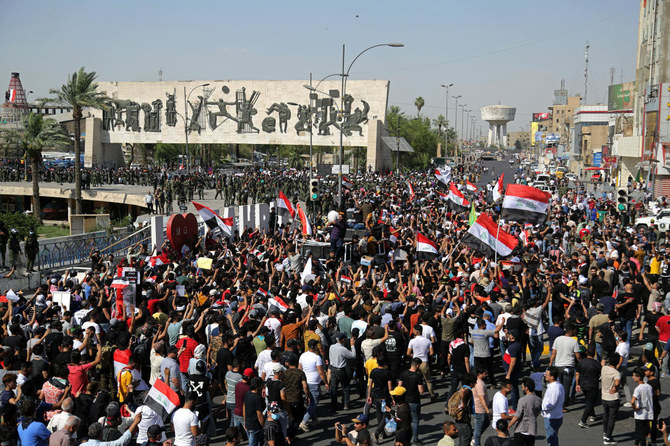
- Security forces used live ammunition to disperse crowds after protesters began throwing stones
- Many waved Iraqi flags and raised portraits of Ehab Wazni, a prominent activist assassinated in Karbala, among three targeted killings in May
Israeli official says Hamas demand for end to war ‘thwarting’ truce efforts
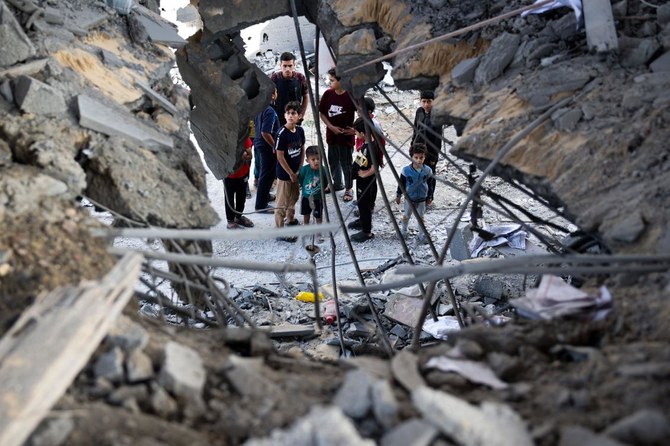
- The official rejected reports that Israel had agreed to end the war as part of a deal to free the hostages held by Gaza militants
- The official said suggestions Israel was prepared to allow mediators to provide Hamas with guarantees of an end to the war were also “not accurate“
JERUSALEM: A top Israeli official said Saturday that Hamas’s continued demand for a lasting ceasefire in the war in Gaza was stymying prospects of reaching a truce.
“So far, Hamas has not given up its demand to end the war, thus thwarting the possibility of reaching an agreement,” the official told AFP on condition of anonymity.
The official rejected reports that Israel had agreed to end the war as part of a deal to free the hostages held by Gaza militants.
The official said suggestions Israel was prepared to allow mediators to provide Hamas with guarantees of an end to the war were also “not accurate.”
The official’s comments came after Hamas negotiators returned to Egypt on Saturday to give their response to a proposed pause in the nearly seven-month war.
Mediators from Egypt, Qatar and the United States have been waiting for Hamas to respond to a proposal that would halt fighting for 40 days and exchange hostages for Palestinian prisoners in Israeli jails, according to details released by Britain.
Despite months of shuttle diplomacy between the warring parties, the mediators have been unable to broker a new truce like the week-long ceasefire that saw 105 hostages released last November, the Israelis among them in exchange for Palestinians held by Israel.
Thousands of Israelis rallied in Tel Aviv late Saturday demanding a deal to free the remaining hostages. They waved Israeli flags and placards calling on the government to “Bring them Home!“
Israel says 128 hostages remain in Gaza. The army says 35 of them are presumed dead.
On Saturday, shortly before 9 p.m. (1800 GMT), a senior Hamas source close to the negotiations in Cairo told AFP there had been “no developments” and the day’s talks “have ended.”
“Tomorrow, a new round will begin,” the source said.
Earlier, the Israeli official had said Israel would not send a negotiating team to Cairo until it saw “positive movement” on the framework for a hostage deal.
“What we are looking at is an agreement over a framework for a possible hostage deal,” the official said.
“Tough and long negotiations are expected for an actual deal.”
Hamas has said the main stumbling block is Israeli Prime Minister Benjamin Netanyahu’s insistence on sending ground troops into Rafah, the south Gaza city that is packed with displaced civilians.
Washington has said repeatedly that it opposes any military operation in Rafah that endangers the 1.2 million civilians sheltering there.
Relative calm in southern Lebanon amid talks on French peace plan and Israeli-US coordination
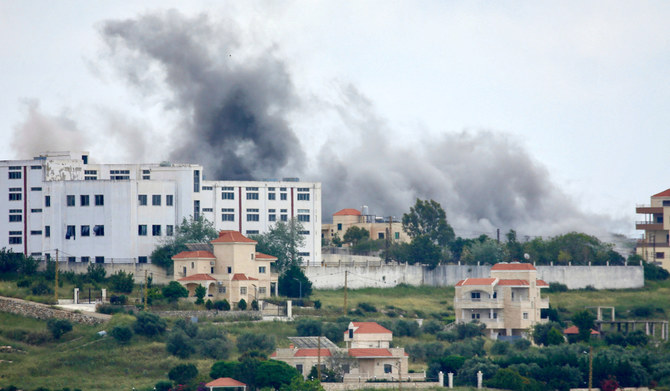
- Lebanese officials receive amended proposal that summarizes meetings held by Stephane Sejourne, France’s foreign minister, in Lebanon and Israel
- On Friday and Saturday there was a noticeable decline, generally, in hostilities between the two sides in southern Lebanon, though there were exceptions
BEIRUT: Discussions continued on Saturday about a French proposal designed to ease tensions and halt clashes between the Israeli army and Hezbollah along Lebanon’s southern border.
Lebanese officials received an amended version of the proposal on Friday, which summarized meetings held by Stephane Sejourne, France’s foreign minister, in Lebanon and Israel.
The proposal also aims to ensure the full implementation of UN Security Council Resolution 1701, which was adopted in 2006 with the aim of resolving the war that year between Israel and Hezbollah.
One political observer said Lebanese officials had prepared a response to the French document and were awaiting Israel’s response.
On Friday and Saturday there was a noticeable decline, generally, in hostilities between the two sides in southern Lebanon, though there were exceptions. One of them was the targeting of the “Israeli Meron Airbase in the Safed area on Friday from Lebanese territories,” Israeli authorities said. Hezbollah did not immediately claim responsibility for the attack. However, the group did say it shelled the Israeli site of Bayad Blida at dawn on Saturday while Israeli soldiers were there.
Meanwhile, the Israeli army opened fire in the vicinity of a shepherd in Wazzani but he was unharmed. Israeli artillery targeted Aita Al-Shaab, Jabal Blat and the outskirts of the towns of Naqoura and Alma Al-Shaab.
Extreme caution seemed to prevail in many border areas as Israeli reconnaissance warplanes continued to operate over Hasbaya and the occupied Shebaa Farms, reaching Western Bekaa and Iqlim Al-Tuffah.
In addition to the diplomatic processes related to the French peace plan, Lebanese authorities were also awaiting the outcome of negotiations in Cairo for a possible agreement between Israel and Hamas on a ceasefire in Gaza. Hezbollah previously linked any end to hostilities in southern Lebanon along the border with Israel to a ceasefire in the Gaza Strip.
Channel 12 news in Israel reported on Saturday that the security establishment in Tel Aviv believed Israeli authorities were close to an agreement with Hezbollah and Lebanon, similar to the provisions of UN Resolution 1701. It said the Israeli security establishment was working with US officials on the process, including American envoy Amos Hochstein, who oversaw indirect negotiations between Lebanon and Israel to demarcate their maritime borders in 2022.
Regarding the French peace plan, Nabih Berri, the speaker of the Lebanese Parliament, said he had received a copy of the document from the French Embassy in Lebanon and will respond.
“It included acceptable points and others that are unacceptable and must be amended, subject to discussion and review,” he added.
The revised proposal refers to a previous ceasefire agreement signed by Israel and Lebanon on April 26, 1996. It also highlights the steps that can be “taken to stop the escalation and ensure the effective implementation of UN Resolution 1701.”
Media leaks suggested its recommendations included “creating a monitoring group with the US, France, Lebanon and Israel. This group would oversee implementation and address any complaints from the involved parties in stages.”
The first stage would require Lebanese armed groups to halt their military operations inside Israel and disputed border regions, refrain from attacking personnel or facilities belonging to the UN Interim Force in Lebanon, and guarantee unrestricted freedom of movement for UNIFIL forces, including patrols in all areas south of the Litani River.
It calls on Israel to “halt military operations inside Lebanon, including airstrikes on Lebanese territory, refrain from any actions that may put UNIFIL personnel or facilities at risk, and ensure UNIFIL’s freedom of movement, including stopping the locking of aircraft radars on UNIFIL naval forces ships.”
Regarding UNIFIL’s mission in the first phase, the French initiative said the force will be “monitoring the cessation of hostilities on the ground and increasing the number of patrols and redeployments along the Blue Line to ensure effective respect for the cessation of hostilities and subsequent commitments by the parties.”
The Blue Line is a demarcation line dividing Lebanon from Israel that was set by the UN in June 2000 to determine whether Israeli forces had fully withdrawn from Lebanon.
The second phase of the French initiative, to be implemented within three days, would involve “dismantling all installations, facilities and centers near the Blue Line, including containers, small towers and tents, and the withdrawal of combat forces, including the Radwan militia, and military capabilities, including shooting capabilities in depth and anti-tank systems, for a distance of not less than 10 kilometers north of the Blue Line.”
It would also require Israel to “stop flying over Lebanese airspace.” It urges Lebanon to resume meetings of the tripartite mechanism, involving UNIFIL and the Israeli and Lebanese militaries, and deploy about 15,000 Lebanese soldiers along the Blue Line south of the Litani River, with UNIFIL and other international partners supporting this deployment.
During a 10-day third phase, Lebanon and Israel, with UNIFIL support, would be expected to resume talks about their land borders. These are intended build on negotiations that took place in 2017, and focus on areas already discussed in 2018 within the framework of the UNIFIL tripartite mechanism, with the aim of establishing an area between the Blue Line and the Litani River free of armed groups and weapons other than those related to the Lebanese government and UNIFIL.
These talks would take place in parallel with international efforts in the form of a support group to assist in the deployment of Lebanese forces in the southern region, and the social and economic development of the region.
Israeli forces kill five Palestinians in overnight raid near West Bank’s Tulkarm
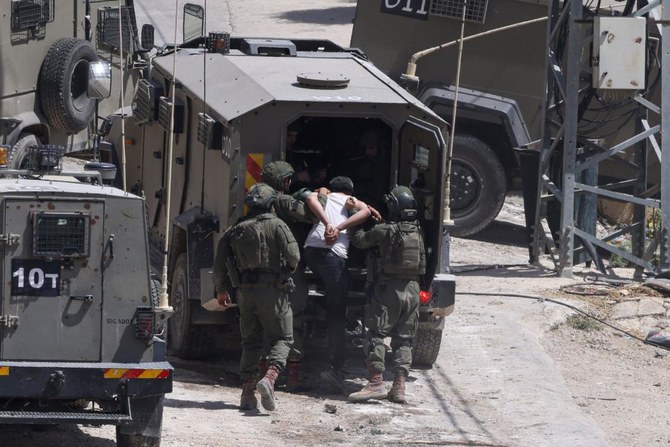
- The health ministry said it had identified four of the five who died during the raid in Deir Al-Ghusun
- The Israeli military said an officer from a special police unit was wounded in the operation and hospitalized
TULKARM, West Bank: Israeli forces killed five Palestinians in an overnight raid in a village near the city of Tulkarm in the occupied West Bank, the Palestinian health ministry and the Israeli military said on Saturday.
The health ministry said it had identified four of the five who died during the raid in Deir Al-Ghusun. Israeli forces took some of the dead bodies, according to the official Palestinian news agency Wafa and a Reuters reporter at the scene.
The Israeli military said an officer from a special police unit was wounded in the operation and hospitalized. It said its forces retaliated using live ammunition and shoulder-fired missiles after they were fired on.
Saturday’s operation near the flashpoint city of Tulkarm was the latest in a series of clashes in the occupied West Bank between Israeli forces and Palestinians that has been escalating for more than two years but which has picked up in intensity since the Hamas-led attack on Israel last October.
According to Palestinian Health Ministry records, 492 Palestinians have been killed by Israeli forces or Jewish settlers in the West Bank or East Jerusalem since Oct. 7. Many have been armed fighters but stone-throwing youths and uninvolved civilians have also been killed.
Palestinians want the West Bank and Gaza, which Israel captured in the 1967 Middle East war, as the core of an independent state with East Jerusalem as its capital.
US-backed talks to reach an agreement between Israel and the Palestinians have been stalled for the past decade but the Gaza war has raised pressure for a revival of efforts to reach a two-state solution.
More than 34,000 Palestinians have been killed in Israel’s seven-month-old assault on the Gaza Strip, say health officials in the Hamas-ruled enclave. The war began when Hamas militants attacked Israel on Oct. 7, killing 1,200 people and abducting 252 others, of whom 132 are believed to remain in captivity in Gaza, according to Israeli tallies.
Tunisian protesters demand eviction of migrant encampment
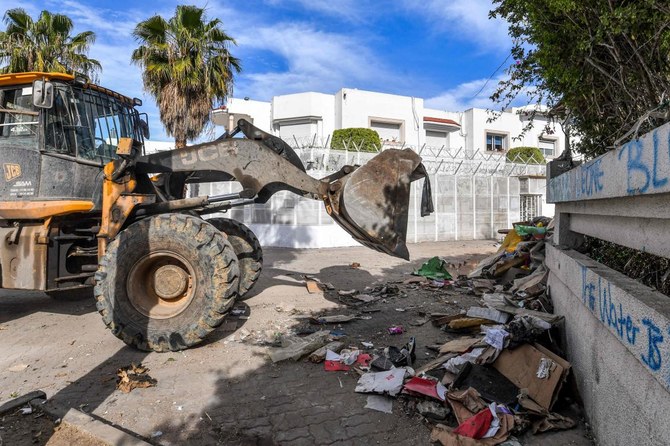
- The demonstration in the small town in central Tunisia follows recent crackdowns by authorities on similar encampments in the capital Tunis and other areas
- In El Amra, protesters called for the “departure” of migrants and the “quick” eviction of the thousands estimated to be staying there
EL AMRA, Tunisia: Hundreds of Tunisians rallied Saturday in the town of El Amra to protest makeshift camps for migrants primarily from sub-Saharan African countries, an AFP correspondent said.
The demonstration in the small town in central Tunisia follows recent crackdowns by authorities on similar encampments in the capital Tunis and other areas, often after complaints from local residents.
In El Amra, protesters called for the “departure” of migrants and the “quick” eviction of the thousands estimated to be staying there, the correspondent said.
Lawmaker Tarek Mahdi said that the “immediate solution” should be to get migrants to “leave urban areas and cities.”
The situation has become “unacceptable” and “the authorities must find a solution,” said Mahdi, who represents El Amra in parliament.
He added that other countries should help Tunisia to deal with a “very significant flow” of migrants.
The town is located about 40 kilometers (25 miles) north of Sfax, a key departure point for Europe-bound sea journeys from where migrants had been forcibly removed late last year.
Many migrants have fled to towns like El Amra, setting up encampments before they can make the perilous Mediterranean crossing, as Tunisian authorities and the European Union have ramped up efforts to curb irregular migration.
A surge of anti-migrant violence last year, following remarks by President Kais Saied who painted “illegal” foreigners as a demographic threat, has also pushed many out of main cities and into smaller towns.
Migrants attempting the sea crossing in search of a better life in Europe often aim to reach Italy, whose Lampedusa island lies some 150 kilometers away from Sfax, Tunisia’s second city.
In recent weeks, authorities raided several encampments, tearing down tents and expelling migrants.
The non-governmental Tunisian Forum for Social and Economic Rights said that authorities in Tunis on Friday cleared encampments and expelled hundreds of asylum seekers, migrants and refugees, sending them in buses to a western area near the Algerian border.
In a statement, the interior ministry said “security measures” had been taken to “deal with attacks on public and private property.”
Last month, Italian Prime Minister Giorgia Meloni visited Tunisia for a fourth time in less than a year to sign deals aiming to curb migration.
A day before her visit, Saied said that Tunisia must not become “a country of transit or settlement” for the tens of thousands of migrants attempting to cross the Mediterranean to Europe every year.
‘Substantial progress’ in Cairo talks on Gaza truce
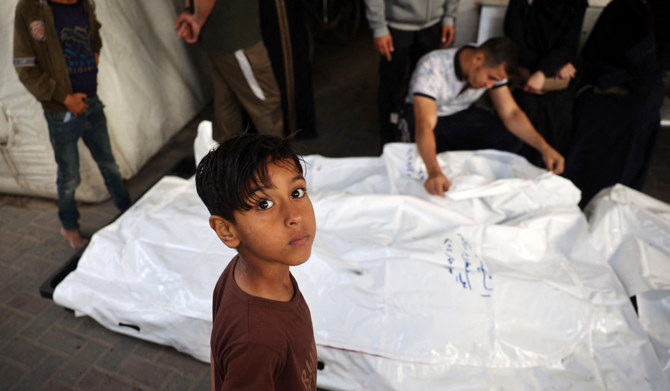
- The second phase will last at least six weeks, with both sides agreeing to release a larger number of hostages and prisoners, and also committing to a longer halt to the fighting
CAIRO: Talks in Cairo involving a Hamas delegation and Egyptian mediators have made substantial progress toward achieving a ceasefire in Gaza, according to a high-ranking source.
The source, who preferred not to be named, told Cairo News Channel that Hamas representatives and an Egyptian security delegation have reached consensus on many contentious points.
Hours before the Hamas delegation’s arrival in Cairo on Saturday, Gen. Abbas Kamel, chief of Egypt’s General Intelligence Directorate, received a phone call from the movement’s leader, Ismail Haniyeh, concerning the negotiations.
Security and political expert Ahmed Mustafa told Arab News: “According to my information, Hamas has agreed to the first phase of the ceasefire deal in Gaza.
“This includes the release of a number of hostages, with the assurance that Israel will fully withdraw from Gaza after 124 days, upon completion of the three stages of the major agreement being coordinated here in Cairo.”
Mustafa also said the Hamas delegation in Cairo is expected to inform the Egyptian side of its agreement with only minor amendments.
“I believe that Hamas has agreed on some terms with the Egyptian mediators now, and previously with the Qatari mediators under American guarantees,” he said.
However, Mustafa said that Israel’s refusal to end the war in Gaza as part of any hostage deal and its determination to eliminate what remains of Hamas remain “major points of contention.”
According to Mustafa, another point of disagreement concerns allowing the entry of dual-use materials into the enclave, for example humanitarian supplies that could also be used for combat purposes, such as fuel.
He said that the first phase, which Hamas “has tentatively agreed upon, will last up to 40 days, during which up to 33 of more than 100 Israeli hostages held in Gaza since Oct. 7 will be released.”
The second phase will last at least six weeks, with both sides agreeing to release a larger number of hostages and prisoners, and also committing to a longer halt to the fighting.
Aboud Jamal, a researcher on Palestinian affairs, told Arab News: “Hamas announced on Friday evening that settlements had been reached, and a delegation from the movement would head to Cairo on Saturday to secure an agreement in a way that meets the demands of the Palestinians.”
Jamal added: “It is clear that the coming days will witness an agreement to cease fire along with the release of some Israeli hostages.
“The only remaining issue is the stance of the Israeli government, which seems to want to prolong the war to maintain (Benjamin) Netanyahu’s government following the recent protests against him in Israel.”
Jamal said the Israeli government stands to benefit by obstructing any agreement.
“So, by sending its delegation to Cairo and discussing its agreement to terms in the prospective deal through mediators, Hamas has preempted the Tel Aviv government, a move for which the movement’s leaders are to be commended.”
He added: “It appears that Egypt truly stands with the Palestinian people and is supportive of reaching an agreement that ensures a ceasefire to save what can be saved of the lives of Gaza’s residents.
“This was evident from the statement issued by Hamas before its security delegation headed to Cairo, stating that Hamas leader Ismail Haniyeh appreciates the role that Egypt is playing.”



